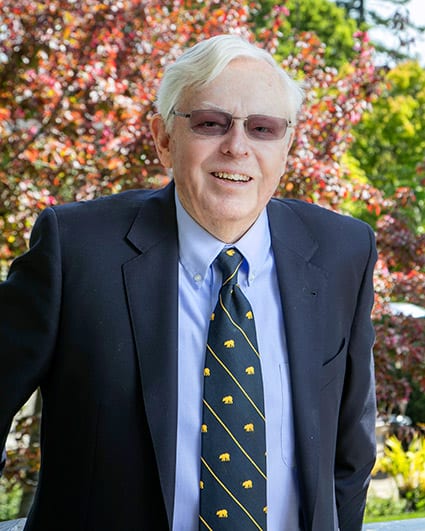
As a Berkeley undergrad, Carl Anderson couldn’t see a law career for the trees. Or, rather, the rocks.
“I had never met a lawyer before,” he says. “But my Boy Scouts summer camp was up in the Sierra and I just loved geology. That’s what I wanted to study when I went to Cal.”
But university coursework required Saturday hikes, which often conflicted with another abiding passion: Golden Bear football games. Anderson played trumpet in the marching band. Meanwhile, other challenges weren’t limited to climbing the Berkeley hills to map synclines and anticlines. He suffered bouts of poison oak, and “I was losing my eyesight in the mineralogy lab, trying to look through little binoculars and magnifiers at all these facets on all these stones.”
A career assessment test, quizzically, suggested that he become a farmer. He went back two years later, this time better prepared to appraise his interests and talents.
“Law came out way on top,” Anderson says.
And so marked the origins of a fruitful career. After law school, he spent a year in Germany on a Boalt fellowship before joining the Alameda County District Attorney’s Office. He served as a judge on the Alameda County Superior Court from 1975 to 1984, then was appointed to the state’s First District Court of Appeal in San Francisco—a post Anderson held until he retired in 1997.
These days he’s arbitrating and mediating business disputes, putting in 20 to 60 hours per week.
“I sort of flunked retirement,” says Anderson, who lives in Piedmont with Margo, his wife of 52 years.
Never one to waste time, while on the Court of Appeal he wrote “Time on Appeal” (published by the American Bar Association and based on the experiences of five state intermediate appellate courts), posing suggestions to speed up judicial proceedings. When he joined the court, judges were laboring through a three-year case backlog.
“As far as the judges were concerned, we just had to work more,” Anderson says. “We decided that by doing 10 opinions per judge, per month, we’d be able to clear the backlog in a couple years. And we did.”
But the plan depended on superior court reporters filing transcripts more expeditiously—at the risk of being held in contempt of court.
“We didn’t want to be heavy-handed and force fines on court reporters, but we wanted some cooperation,” Anderson recalls. “Ultimately, we were able to get it.”
Long before that, Boalt imparted some important lessons.
“You learn to ask a lot of questions and to be inquisitive,” he says. “And you learn that maybe your first impression isn’t always the right impression.”
Even if it takes poison oak to drive home the point.
—Andrew Faught
